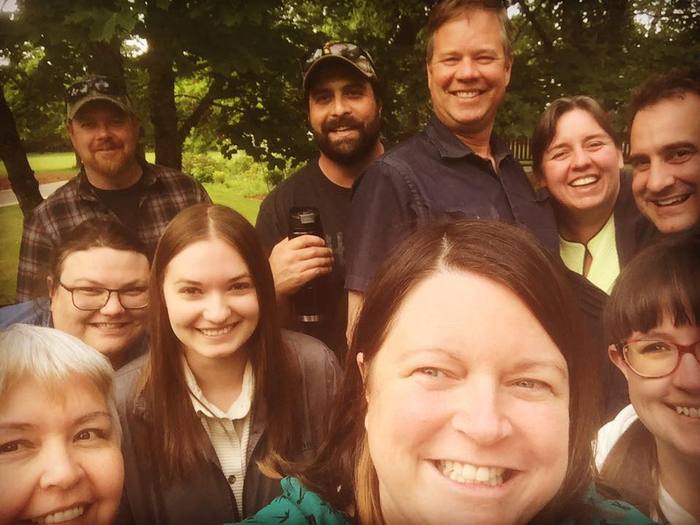This is BCcampus’ third post exploring Teaching and Learning Centres in British Columbia. The first introduced Tim Paul from Douglas College, and the second, Janni Aragon at the University of Victoria.

Post by BCcampus’ editorial team
In this third post, we reached north to Carrie Nolan, Dean, Center of Learning Transformation (COLT) at Northwest Community College (NWCC). NWCC has numerous campuses, meaning more access to more education for northern B.C. residents. Carrie works out of the Terrace campus.
What do you love about your work?
Carrie Nolan: I love identifying what the College does best in teaching and learning, and facilitating more of that. For NWCC, our best is experiential place-based learning. When we connect the classroom to our place – culturally, socially, geographically – we provide the best learning experiences to students, such as Professional Cook students preparing and serving lunch at a local shelter, or University Credit students taking a ‘People of the Skeena’ course out on the river.
I love bringing out-of-the-box ideas to life challenging current understanding of education. We are installing a yurt that will serve as COLT’s teaching lab. The space – being circular – will give us a quite literal out-of-the-box space to experiment with and encourage learning with the head (understanding), heart (care), and hands (practice).
How would you describe NWCC to someone unfamiliar?
CN: NWCC is all about adventurous pathways to transform lives. Students can start here and finish anywhere. Some examples include starting with a year or two at the Frieda Diesing School of Northwest Coast Art and continuing at Emily Carr, or completing an Associate’s Degree here and finishing with a Bachelor’s Degree at Monash University in Australia.
One of the most outstanding things about the College is that we are on the territories of seven Nations (Haida, Tsimshian, Nisga’a, Haisla, Gitxsan, Wet’suwet’en, and Tahltan). The density of nations here means unparalleled the access to a variety of traditions, languages, and practices.
Can you tell us about the college’s relationship with BCcampus?
CN: Particularly in the area of teaching and learning, we benefit from and appreciate the involvement of BCcampus with BCTLC. With 25+ PSE institutions in B.C., it is valuable to have provincial coordination and support on key issues so each institution doesn’t have to reinvent the wheel.
What interesting work and research is underway at your Center of Learning Transformation (COLT)?
CN: We are launching a collaborative ‘Pebble Project’, the idea of which is that changing one thing in how we teach could have a tremendous ripple effect on learning. The project’s first year will see a group of faculty each identify a question they have, relating to experiential place-based learning. As they identify ways to answer their question, the group will serve as sounding board and support. From there we will create our own ripple effect, having this year’s participants facilitate new groups of faculty pursuing scholarly inquiry.
We are also exploring peer observation on instruction in Video Conferencing classes by having faculty sit in on the ‘far’ side of the class and observe a colleague teaching.
Innovative instructors are experimenting with ways to incorporate technology, such as virtual reality, 3D printing, and drones into the classroom to support learning.
Additionally, we are undergoing major technological upgrades College-wide, including elevating and standardizing our classrooms with tools such as Epson Interactive Whiteboards and Brightlink projectors with Polycom Eagle Eye cameras.
What do you see happening right now in post-secondary education (PSE) that demands attention or change?
CN: To remain relevant and effective, quality of education in PSE must be considered in the design, delivery and assessment of learning. Part of this quality will be shifting from providing instruction to producing learning – a shift from inputs (what needs to be taught, what content to deliver) to outputs (what and how do we want students to learn and how do we know they are learning?).
Teaching must be about more than delivering content because content (information) in our digital age is available anywhere, anytime. Teaching must encompass significant learning. How we know is now as important, if not more important, than what we know.
Learn more:
- Visit Northwest Community College
- Bridging the gap with UVic’s Technology Integrated Learning Department
- 4 Questions with Tim Paul on the evolving role of teaching and learning centres
Join us at an upcoming event:
-
Facilitating Learning Online (FLO) – Synchronous – Oct 23 – Nov 10, 2017 – FULL – sign up for the waitlist
-
Fall ETUG Workshop – Oct 27, 2017
-
Symposium 2017 – Nov 6, 2017
-
Facilitating Learning Online (FLO) – Design – Nov 13 – Dec 8, 2017 – FULL – sign up for the waitlist
-
Festival of Learning 2018 – May 28 – 30, 2018
